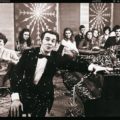- Выступление в Колонном зале Дома союзов
- Поклонники буквально носили Магомаева на руках
- Магомаев в новогодней программе «Голубой огонек»
In the Soviet Union, Muslim Magomayev was enormously popular. His records sold in huge numbers, and after his concerts his enthusiastic audience would worship the ground on which their idol walked. This was not because of his brilliant singing technique but because of what the performer called “putting his heart into his voice.”
The Phenomenon of Magomayev
Famous poet Robert Rozhdestvensky once said, “I have attended many concerts at which Muslim Magomayev sang, and there has never been a time when the announcer managed to give the full name and surname of the artist. Typically, after the name Muslim, the audience would give the singer such a thunderous standing ovation that, despite the most powerful speakers and all the efforts of the announcer, the surname Magomayev inevitably drowned in the enthusiastic roar.” However, this success was largely unexpected.
Muslim Magomayev was born to an artistic family in Baku on August 17, 1942. His grandfather (also called Muslim) was one of the founders of Azerbaijani classical music, his mother Aishet was a theater actress, and his father Mahammad worked as a set designer. Mahammad Magomayev died several days before the end of the Great Patriotic War, and Aishet was always on tour. Due to this, Muslim grew up in the family of his uncle Jamal, an Azerbaijani political party official and a statesman. In his biography, Magomayev recalled a funny incident when, as a child, he broke his grandfather’s Amati violin into pieces because he wanted to see “the Amati that was sitting and squeaking inside.” Despite his childhood mischiefs, Magomayev studied music seriously and majored in piano and composition at the Baku Academy of Music. At home, Muslim listened to records from his grandfather’s collection, namely, to singers such as Enrico Caruso, Titta Ruffo, and Beniamino Gigli. Italian masters sparked his interest in singing. However, Muslim was too shy to sing in public and most of the time practiced after classes in empty school corridors. It was only when he was 14 that his family was amazed to discover that their lean and lively teenager had a good voice and a stunningly strong mellow baritone! The Academy had no vocal department, so Muslim went to the Baku College of Music. Just a year later, the aspiring artist gave his first performance at the House of Culture of the Baku Sailors, unbeknownst to his uncle. Magomayev Senior believed that his nephew was not ready to perform as his voice had not yet developed properly. Nevertheless, Magomayev Junior was sure that it was time to start singing professionally!
A great ship asks deep waters
Magomayev’s career was booming. Just three years after his graduation from college, the Azerbaijani government sent him to the 8th World Festival of Youth and Students in Helsinki. After this event, Ogoniok, a popular magazine, published an article titled “A young man from Baku conquers the world.” A year later, at a concert at the State Kremlin Palace within the Decade of Culture and Art of Azerbaijan, he was applauded by Yekaterina Furtseva, the USSR Minister of Culture, and Ivan Kozlovsky, the legendary tenor of the Bolshoi Theater. However, Magomayev most valued the note he received from the attendants of the State Kremlin Palace. It read, “We, the attendants, are involuntary witnesses of the audience’s raptures and disappointments. We rejoice your success in this glorious hall. We hope to hear more of you and your Figaro on our stage. A great ship asks deep waters.” That same year, in 1963, Magomayev gave his first solo concert in Moscow, and the crowd wrested the door open at the Tchaikovsky Concert Hall to listen to the young singer. Magomayev was a remarkably versatile singer. He brilliantly performed operatic repertoire along with folk and pop songs. Muslim was a soloist of the Azerbaijan Opera and Ballet Theater and trained at La Scala in Italy, but despite his great love for opera Magomayev always considered himself a pop singer first.
Music without borders
Muslim Magomayev successfully represented the Soviet Union abroad. In 1966 and 1969, he performed at the Olympia Theater in Paris. In 1969, Magomayev received the First Prize at the International Pop Song Festival in Sopot, Poland. Also, in 1969, Muslim went to Cannes for MIDEM, the leading international event for the global music community. The festival attracted performers who had sold large numbers of records. The audience at Cannes gasped when it was announced that Magomayev had sold 4.5 million copies of his records! The Soviet singer received the Golden Disc award along with The Beatles, Adriano Celentano, Salvatore Adamo, and other stars.
The Formula of Love
What is the secret of Magomayev’s phenomenal appeal? Once Muslim noted that, “I don’t want to fake passion, I have to be sincere when I sing. There’s more to it than vocal technique: it means putting your heart into your voice.” Every one of Muslim’s concerts involved lively interactions with his listeners. The audience did not so much enjoy the brilliance of the performance but the emotions they experienced along with the singer. Magomayev had an incredible appreciation for his audience. Once he even turned a wedding into an impromptu performance! On November 23, 1974, Muslim Magomayev and opera singer Tamara Sinyavskaya were celebrating their wedding in the Baku restaurant in Moscow. A crowd of fans gathered outside. At some point, Muslim gave way, asked to open the windows, and sang a song for his uninvited guests, and then another. All in all, Magomayev sang for 40 minutes without a break. The audience was happy, and so were the newlyweds, although Muslim came down with bronchitis afterwards.
Magomayev’s songs appealed to general secretaries and ministers alike. He even became the youngest People’s Artist of the Soviet Union at the age of 31. Magomayev had hardly any career failures, largely because he was self-critical. For example, Muslim flatly refused to act in films. He did not mind musical films, and even voiced the Troubadour in the Soviet cartoon Town Musicians of Bremen. Still, he believed that serious films were for great actors. Magomayev acted in a feature film only once, as Persian poet and philosopher Nizami in the eponymous movie (1982).
As he grew older, Magomayev performed less and less often. He did not want his audience to see that he was aging and lowering his standard. Nevertheless, the memory of the golden voice of the Soviet era is embodied in monuments, stamps, and street names. Ultimately, Magomayev immortalized his talent in numerous fascinating songs.
Tatiana Borisova



